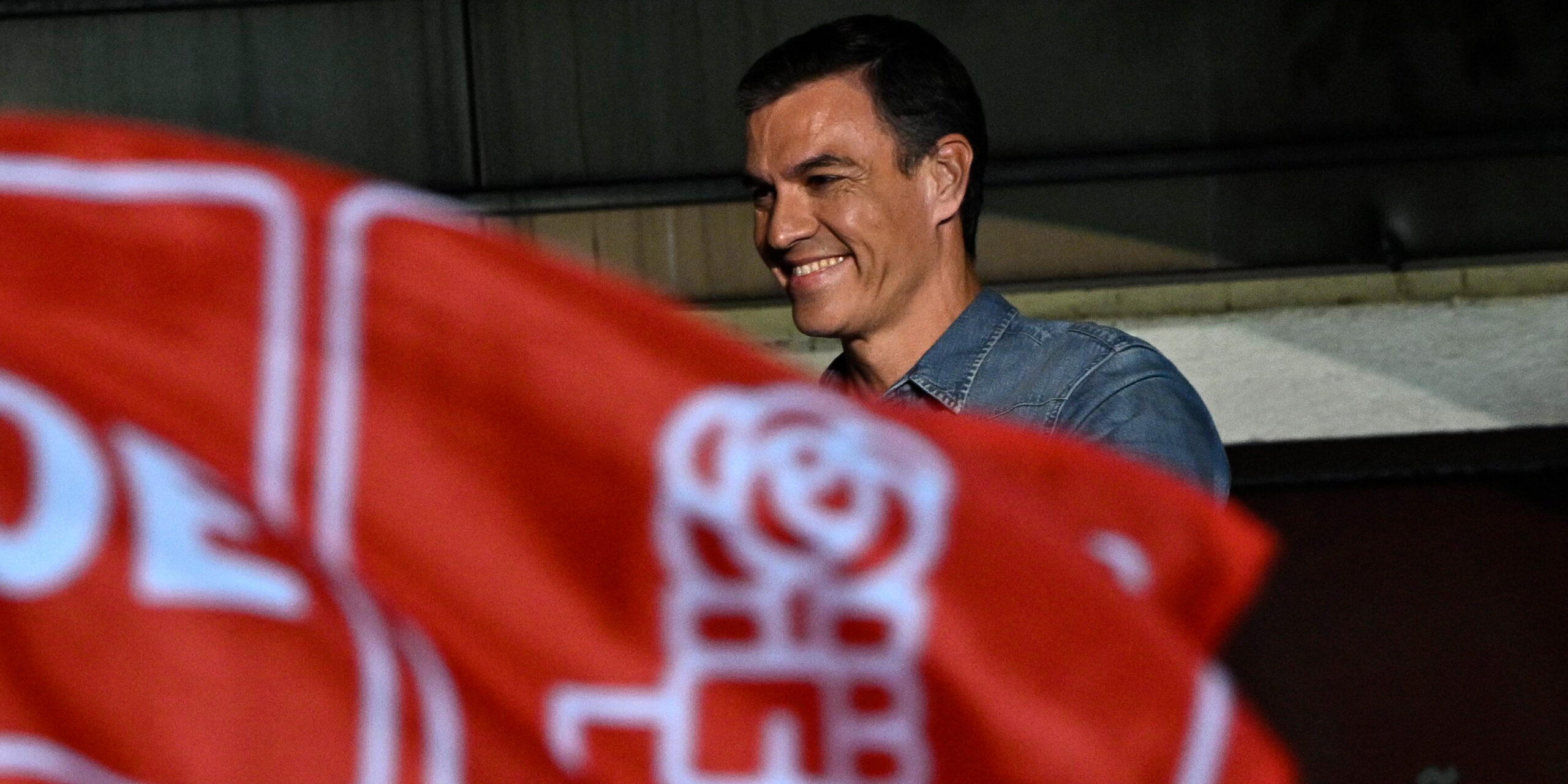Caroline Baudry with AFP // Photo credit: JAVIER SORIANO / AFP
modified to
06:48, July 24, 2023
Given the loser of the legislative elections by all the polls, the Socialist Prime Minister Pedro Sánchez managed on Sunday to limit the gains of the right-wing opposition and retains, against all odds, a chance to stay in power in extremis thanks to the game of alliances. After counting more than 99% of the votes, the Popular Party (PP) of its conservative rival Alberto Núñez Feijóo totaled 136 seats out of a total of 350 in the Congress of Deputies and the far-right Vox party, its only potential ally, 33 seats.
The PP therefore won 47 more seats than in the previous elections, in 2019, but was far from the 150 seats that Alberto Feijóo was aiming for. Above all, the PP and Vox, which has lost ground compared to the last ballot, only total 169 seats, while the absolute majority is set at 176. The Socialist Party of Pedro Sánchez is credited with only 122 deputies and Sumar, his radical left ally, with 31.
But Pedro Sánchez, in power for five years, is paradoxically in a better position than his conservative rival and can hope to stay in power, because he has the possibility of obtaining the support of the Basque and Catalan parties, for whom Vox is a bugbear. “The retrograde bloc of the People’s Party and Vox has been defeated,” he told socialist activists gathered outside his party’s headquarters. “There are many more of us who want Spain to keep advancing,” he continued.
Alberto Feijóo, however, claimed victory. The PP “won the elections”, he launched from the balcony of the party headquarters, affirming his intention to “form a government” and asking the Socialists not to “block” such a government.
“Real Surprise”
“It’s a real surprise, the Socialist Party has resisted much better than expected. There are two scenarios: (the maintenance of) Sánchez (in power) or new elections,” Antonio Barroso, an analyst at the Teneo firm, told AFP. The polls carried out over the past five days, the results of which were published when the polls closed at 6 p.m. GMT, as required by law, all predicted a large victory for the PP and even the possibility of an absolute majority with the support of Vox.
Alberto Feijóo wants to govern as the winner of the elections, but without an absolute majority, he would need the abstention, during a vote of investiture in Parliament, of the Socialists, who “will not give it to him”, continues Mr Barroso. Because given the results, Pedro Sánchez seems able to gather on his name 172 deputies, more than the leader of the PP, and could therefore be returned to power, provided that the party of the Catalan separatist Carles Puigdemont does not vote against him.
Otherwise, Spain, which has already experienced four general elections between 2015 and 2019, would find itself in a new situation of political deadlock and could be condemned to a new ballot.
gamble
Accustomed to poker moves, Pedro Sánchez therefore retains the chances of succeeding in his last bet. Wanting to regain the initiative after the rout of the left in the local elections at the end of May, he called this early election and campaigned on the fear of entering the government of Vox, who already leads with the PP three regions out of the 17 in the country, in order to mobilize the electorate on the left.
A strategy that seems to have paid off, with turnout reaching nearly 70%, or 3.5 points more than in the last election in November 2019. Acclaimed last year at the head of the PP, Alberto Feijóo missed his mark.
This former president of Galicia (north-west) campaigned on “the repeal of Sanchism”, a neologism referring to the name of Pedro Sánchez, whom the right accuses of having crossed red lines, in particular by pardoning the Catalan separatists condemned for the 2017 secession attempt or by negotiating in Parliament the support of the Basque party Bildu, heir to the political showcase of ETA, to have his reforms adopted.
At the headquarters of the PP in Madrid, Carmen Rodríguez de la Cruz, showed her disappointment. “I didn’t expect it, I’m going to have to put up with Sánchez for four more years,” she told AFP. This election has aroused unusual interest abroad because of the possibility of a PP/Vox coalition coming to power in a country considered a pioneer in terms of women’s rights or those of the LGBT + community. Such a scenario, which now appears unlikely, would have marked the return to power of the far right in Spain for the first time since the end of the Franco dictatorship in 1975, almost half a century ago.
